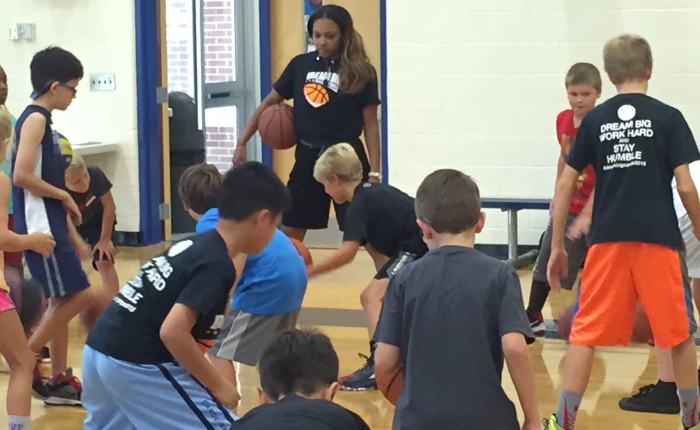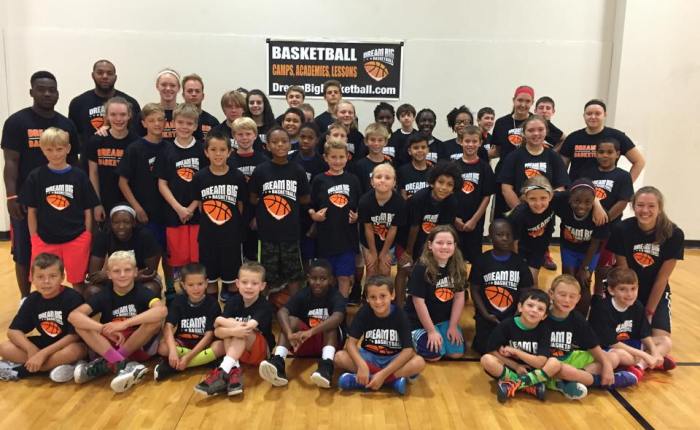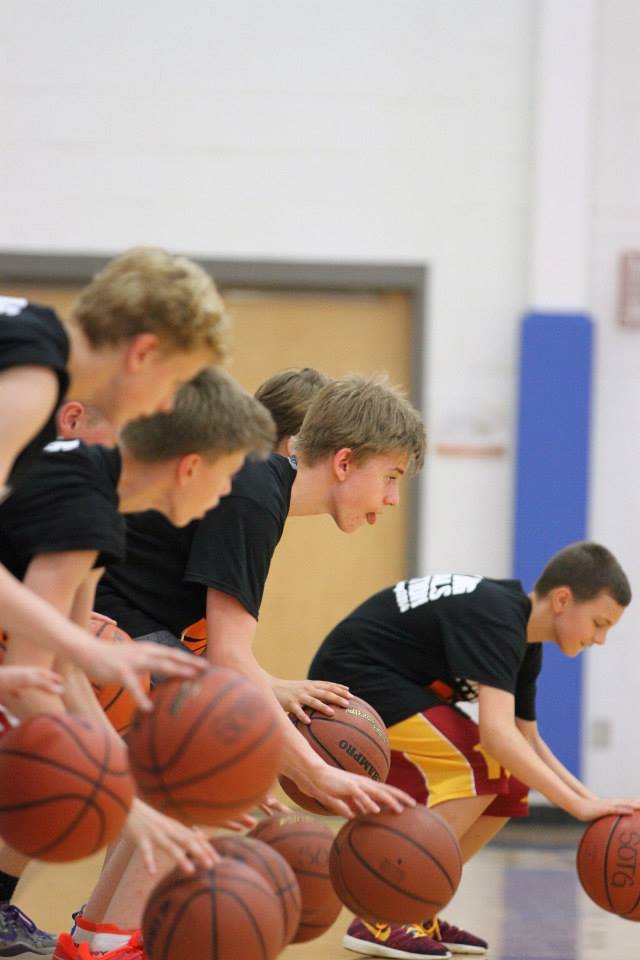This is a guest blog post by 3 students that are taking graduate classes at NC State; Rakeem Brawley, Kevin Canevari and Shahnee Haire.
No matter what team you are rooting for, the love of basketball seems to bring a variety of individuals together. Basketball has been around for years and has become one of America’s favorite sports. A few people are aware that the American sport was created in the late 1800’s by a physical education teacher, that needed an activity to keep students engaged and a distraction from negative behaviors. Who would have thought that the sole purpose of this exciting sport, was created to keep at risk youth occupied? Our blog group also realized that basketball isn’t just a game, but has the pieces needed to produce the framework for positive youth development. “Bounce around” below to view the six ways to relate basketball to youth development.
- The Coach
As a coach, your role impacts how youth feel about themselves as a young athlete and as an individual. As coach you should be an everyday role model and make training a positive experience. The challenge of coaching youth is to provide discipline, cognitive development and self-esteem while keeping training “fun”. When training/playing is enjoyable youth want to come back. With greater commitment youth develop better mastery of skills and superior knowledge of tactics and strategy. This can lead to the development of strategic thinking which is helpful in all aspects of life.
Positive Reinforcement Supports Youth Self Esteem:
It is important to provide positive reinforcement when training youth but not unless they are putting forth their best effort. Instead of telling them what they are doing wrong all the time, focus on what they are doing correctly, while helping them correct the things they are doing wrong. In coaching them on what they are doing incorrectly choose words like “lets focus on trying to get your foot higher” or “that was great next time let’s try…”. Negative reinforcement is shown to discourage young athletes and negatively impact self-esteem.
Leadership Skills:
Leadership is the ability to motivate people to challenge themselves and meet goals. Competitive team sports create an environment where people must work together to achieve their goals. Participation in sports can assist youth in developing strong leadership skills. A team approach is an important component of developing leadership traits. In coaching youth provide team related challenges that encourage the youth to work together to achieve specific measurable goals. Sports are by nature competitive and can foster rivalry. Instead, foster team spirit and cohesion. Eventually, a “captain” will stand out and become the accepted position of team leader.
- Referee
Referees in basketball can be one of the upmost importance when teaching young athletes life lessons. Drawing the parallel of referees as being somewhat of the “law or authority.” Children must learn to follow the rules and realize their mistakes. The youth athletes also grow by understanding how to deal with a “bad call” or one that they disagree with and not lose their temper. This is a vital lesson that can sometimes be hard to convey from a parent. A referee’s job is to make the game fair and young adults can discover themselves and how to deal with good and bad calls in a way that is of high character and leadership.
Mental Development:
Referees play a role in the mental development of the youth. They are taught to respect authority. Referees have the chance to make calls from a completely unbiased perspective and that is something that some kids have never had. As young athletes grow mentally, they start learning the do’s/don’ts and their strengths/weaknesses, all through the set of rules that the referees are enforcing. These parallels of respecting leadership can be drawn to law enforcement, teachers, parents, and/or any form of authority in a child’s life. A child’s mentality is strengthened in learning how to respect the referees.
Technical Fouls:
In basketball, there are what is called, “technical fouls.” This is when a player does something that is way out of line. Two technical fouls equal an ejection. If you do something that the referee feels is way out line (ex. throw a punch), they can give you two technical fouls at once which is an ejection. Each technical foul equals 2 free throws and the other team’s possession of the ball. Technical fouls are like yellow/red cards in soccer and unsportsmanlike penalties in football. They teach kids how to control extreme emotion and not let impulse take over. In competition, things can get intense and highly emotional, this also true in life. Referees can teach children lessons that can save their life. One bad decision can set youth down a bad path and referees are able to help the youth understand where to draw certain lines, through the giving of technical fouls.
- The Player
Youth sports can promote the development of problem-solving skills as well as teaching youth how to work cooperatively with peers as a member of a team. According to research, youth sports are all about promoting physical activity and healthy lifestyles as well as strengthening communities.
Strength Training
Basketball requires you to perform a diverse set of athletic techniques including running, jumping and quick lateral movements. Basketball provides an excellent full-body workout and can help you develop useful, lean muscle. People who don’t play basketball may not realize that it is a physically intensive contact sport. Defense and rebounding are two aspects of the game that are highly reliant on effective body positioning and the ability to maintain that position when your opponent exerts bodily force upon you.
Mental Development
Basketball requires a wide range of physical skills, but it is also a fast-paced mental game. Research on the mental aspects of basketball has revealed that players must develop a great deal of attentional control to quickly and accurately process what’s happening on the court and make effective decisions with the ball and on defense. Attentional control refers to your ability to direct your focus in a desired direction; in basketball, you must train yourself to constantly observe your teammates and opponents and evaluate what course of action to take in response to their actions.
Motor Coordination
To be a good basketball player you must learn to perform many skills with the ball. Practicing skills like free throw shooting and jump shooting is particularly helpful for training your hand-eye coordination. Rebounding missed shots is another skill that requires a great degree of full-body coordination. To be a successful rebounder you must coordinate the timing of your jump to reach the ball as it caroms from the hoop and do so before other players do. Rebounding also trains hand-eye coordination, as you must safely secure the ball with your hands before others tip it away.
- Social Media Influence
Social Media is a huge part of our youth’s development. Children are creating their own social media pages as early as elementary school. These pages and apps include Facebook, Twitter, Instagram, snapchat and many more. This growing phenomenon is something that has had a unique impact on society, specifically kids and young athletes. Children are now finishing basketball games, going to their virtual pages and reading everything that everyone must say about their performance, good and bad. The Internet and social media has caused a lot of athletes to become way more self-absorbed than ever before. While it can be used in a positive way, children need to be careful with how they are using it and what they are posting. When used properly, social media can show the youth how to take compliments and remain humble as well as take criticism and remain driven.
Mental Development/Perspective:
Social media influences the mentality of our youth. As children are growing mentally in today’s day and age, we must focus on our attention to their perspective on things. As divisive as times are, social media plays a role in athletics and kid’s minds. Children are forced to make strong opinions early, sometimes before they are ready or understand certain situations. Youth must be educated and fully aware of what they are putting their name on before it is shared to the world. Secondly, kids must understand that social media is not an area to turn to for sympathy or to become self-absorbed. The internet can cause a youth’s mind to be more into themselves than what is healthy and that can be toxic for not only a basketball team, but any type of team environment.
Rules by Parents:
In college, many coaches have a rule to their athletes that says do not post anything on social media that you wouldn’t want your mother/legal guardian to see. I think this is a great school of thought. Youth must realize that even a “retweet” of someone else’s words is still them putting their name on something. The child should not only be concerned with whether the post will be accepted by a potential college recruiter, employer, etc., but should also care about their character and reputation before they post certain things. Before kids post things, they should ask themselves, “Would my parent/guardian be proud of this post?”
- Parental Support
Parents and guardians play a vital role in a young person’s life. An involved parent can mold a juvenile’s mind negatively or positively, through exposing their children to a variety of activities at an early age. Basketball is one activity that contributes to parental support and involvement by promoting attendance of guardians during games (either recreational or organized). Basketball helps create bonds and possibly daily interactions between parent and child. When a parent shows up to support their child at a basketball game or even to play one on one that action; assists with self-esteem, promotes trust, forms unity, and increases physical fitness. A child that has a proactive parent in their life that supports participation in basketball, can grow into a well-rounded individual.
Creating Bonds:
The bond between a parent and child can be unbreakable, and the game of basketball can assist with that bond. A parent can increase a positive relationship with their child by; making sure they start on a firm foundation, understanding that a relationship takes work, making time for their child, setting healthy respectful boundaries, and interacting with their child through daily interactions and extracurricular activities (such as basketball).
- Opposing Team/Non-Supporters
As a child transitions to adulthood, they will begin to realize that everyone is not their friend. During the early childhood phase, we want everyone to be our friend and form intense attachment to others (especially parents). Being involved in basketball will quickly teach youth that everyone is not rooting for you and/or supports you. Basketball is a game that helps set boundaries for youth to discover by competing against an opposing team.
Sportsmanship:
The simple act of sportsmanship through a gentle handshake or high five after each basketball game, shows youth that it’s okay to respect the opposing team. Sportsmanship is important because it creates fairness, conflict resolution, and respecting the judgment of officials. Sportsmanship builds respectful youth that turn into understanding and respectful adults.
Thank you Rakeem Brawley, Kevin Canevari and Shahnee Haire for adding value to our blog!


